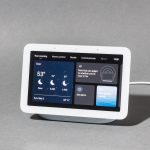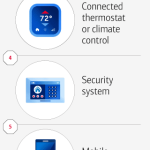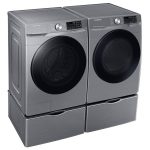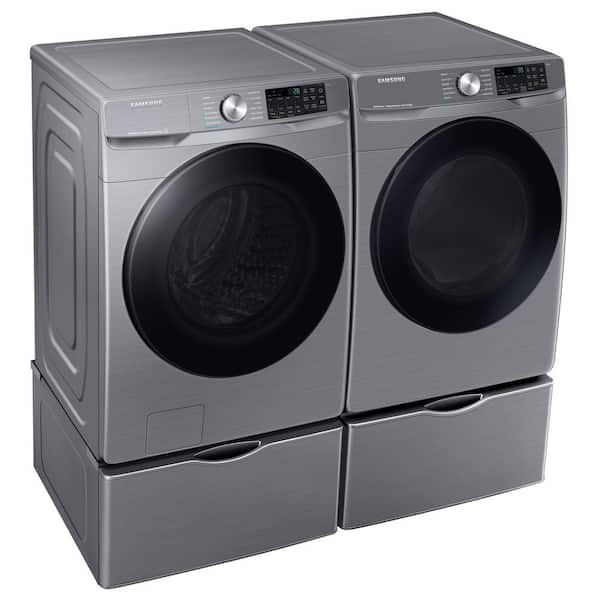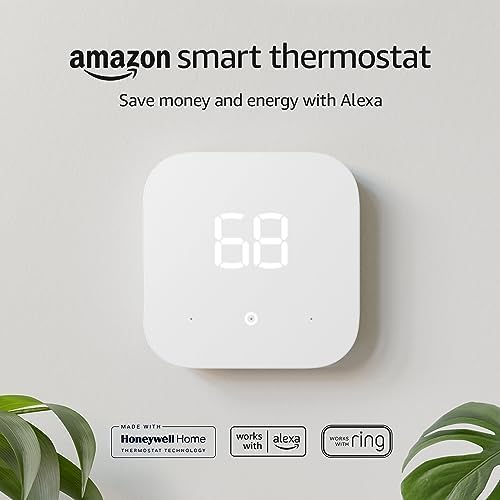
The best smart thermostats for Alexa include the Ecobee SmartThermostat and the Nest Learning Thermostat. They help save energy and money.
Smart thermostats integrated with Alexa offer a convenient way to control home temperatures using voice commands. These devices use advanced algorithms to learn your schedule and preferences, ensuring optimal energy usage. The Ecobee SmartThermostat features room sensors to manage hot and cold spots, while the Nest Learning Thermostat adapts to your lifestyle.
Both models provide energy reports, helping you monitor and reduce consumption. They can also be controlled remotely via smartphone apps, making it easier to manage home comfort from anywhere. Investing in these smart thermostats not only enhances convenience but also contributes to significant energy savings, lowering utility bills.
#Tags : best smart thermostats for alexa | alexa thermostat, smart thermostat alexa | alexa compatible thermostats | works with alexa thermostat | best alexa thermostats | best thermostat with alexa, best thermostat alexa | best thermostats for alexa | smart thermostats that work with alexa | smart thermostat that works with alexa | smart thermostat works with alexa | what thermostat works with alexa | what smart thermostat works with alexa | smart thermostats compatible with alexa | smart thermostat compatible with alexa | best alexa enabled thermostat | best alexa-enabled thermostat | which smart thermostats work with alexa | best smart thermostat compatible with alexa | best alexa controlled thermostat

Credit: www.amazon.com
Introduction To Smart Thermostats
Smart thermostats are revolutionizing how we manage home energy use. These devices are easy to install and offer advanced features. They connect seamlessly with Amazon Alexa for voice control. This blog will explore the best smart thermostats for Alexa.
What Is A Smart Thermostat?
A smart thermostat is a device that controls your home’s heating and cooling. It connects to your home Wi-Fi network. You can adjust settings using a smartphone or voice commands.
These devices learn your schedule and preferences. They adjust temperatures automatically. This helps you save energy and money.
Benefits Of Smart Thermostats
Smart thermostats offer several advantages:
- Energy Savings: They optimize your heating and cooling, reducing energy waste.
- Cost Efficiency: Lower energy use translates to reduced utility bills.
- Convenience: Control your thermostat from anywhere using your phone.
- Voice Control: Use Amazon Alexa for hands-free adjustments.
- Learning Capabilities: They learn your habits and adjust settings automatically.
Smart thermostats also provide detailed energy reports. You can see how much energy you use and find ways to save more.
Alexa Compatibility
Smart thermostats are a great way to save energy and money. When paired with Alexa, they become even more powerful. Alexa compatibility allows you to control your thermostat using simple voice commands. This means adjusting your home’s temperature without lifting a finger. Here, we’ll explore why Alexa integration is beneficial and how to connect your smart thermostat to Alexa.
Why Alexa Integration?
Alexa integration brings several advantages to smart thermostats. Firstly, voice control is incredibly convenient. You can adjust settings while cooking, cleaning, or relaxing. No need to stop what you’re doing. Secondly, Alexa can help you optimize energy usage. You can set routines and schedules with voice commands.
For example, say “Alexa, set the thermostat to 72 degrees.” Alexa will instantly adjust the temperature. This helps in maintaining an optimal environment. It also ensures you are not wasting energy. Additionally, you can integrate your thermostat with other smart home devices. This creates a seamless and intelligent home ecosystem.
How To Connect To Alexa
Connecting your smart thermostat to Alexa is simple. Follow these steps:
- Ensure your thermostat is installed and connected to Wi-Fi.
- Open the Alexa app on your smartphone.
- Tap the menu icon and select “Skills & Games.”
- Search for your thermostat’s brand and select the corresponding skill.
- Enable the skill and follow the on-screen instructions to link your account.
- Once linked, you can use Alexa to control your thermostat.
You can now use voice commands to adjust the temperature. Some common commands include:
- “Alexa, set the thermostat to 70 degrees.”
- “Alexa, increase the temperature by 2 degrees.”
- “Alexa, what’s the current temperature?”
These commands make managing your home’s temperature easy and efficient. Enjoy the comfort and savings that come with Alexa compatibility.
Top Smart Thermostats
Smart thermostats have revolutionized home heating and cooling. They offer energy savings and convenience. Compatible with Alexa, these devices make home automation simple. Here are the top smart thermostats to save energy and money.
Ecobee Smartthermostat
The Ecobee SmartThermostat is a popular choice. It features a sleek design and easy installation. This thermostat uses advanced sensors to optimize temperature settings. It learns your habits and adjusts accordingly.
Features include:
- Voice control via Alexa
- Room sensors for accurate temperature control
- Energy reports to track savings
- Remote access through the Ecobee app
Ecobee’s integration with Alexa allows for hands-free control. You can adjust settings with simple voice commands. It also supports other smart home devices.
Nest Learning Thermostat
The Nest Learning Thermostat is another top choice. It adapts to your schedule and preferences. Nest’s learning capability sets it apart from other thermostats.
Key features include:
- Auto-schedule learning
- Energy-saving features
- Remote control via the Nest app
- Integration with Google Assistant and Alexa
Nest provides detailed energy reports. It helps you understand your energy use. This thermostat can also detect if you’re away and adjust settings to save energy.
| Feature | Ecobee SmartThermostat | Nest Learning Thermostat |
|---|---|---|
| Voice Control | Alexa | Alexa, Google Assistant |
| Energy Reports | Yes | Yes |
| Remote Access | Ecobee app | Nest app |
| Learning Capability | Yes | Yes |
Energy Savings
Smart thermostats can save a lot of energy and money. They are designed to adjust the temperature in your home automatically. This helps to reduce energy waste and lower your bills.
How Smart Thermostats Save Energy
Smart thermostats learn your schedule and adjust the temperature accordingly. This means they can turn off the heat or air conditioning when you are not home. This can lead to significant energy savings.
Most smart thermostats have sensors that detect if someone is in the room. They can adjust the temperature based on this information. This prevents heating or cooling an empty house.
Smart thermostats can also be controlled remotely via smartphone apps. You can adjust the temperature from anywhere. This ensures you are not using more energy than needed.
Energy-saving Features
Smart thermostats come with many features that help save energy. Here are some of the most important ones:
- Adaptive Learning: The thermostat learns your habits and adjusts settings automatically.
- Geofencing: Uses your phone’s location to adjust the temperature when you leave or come home.
- Energy Reports: Provides detailed reports on energy usage to help you understand and reduce consumption.
- Smart Scheduling: Automatically creates a schedule based on your daily routine.
- Voice Control: Works with Alexa for hands-free temperature adjustments.
These features ensure that your home uses energy efficiently. This leads to lower utility bills and a reduced carbon footprint.
| Feature | Benefit |
|---|---|
| Adaptive Learning | Reduces energy waste by learning your habits |
| Geofencing | Adjusts temperature when you leave or arrive |
| Energy Reports | Provides insights to reduce energy usage |
| Smart Scheduling | Creates an efficient heating/cooling schedule |
| Voice Control | Allows hands-free adjustments via Alexa |
Cost Efficiency
Smart thermostats for Alexa can save both energy and money. They offer many benefits, making them a cost-efficient choice. This section breaks down the initial investment and long-term savings.
Initial Investment
The initial cost of a smart thermostat varies. Prices range from $100 to $300. It depends on the brand and features. High-end models have advanced functions. These include learning capabilities and more sensors. Here’s a table to help compare some popular models:
| Model | Price | Special Features |
|---|---|---|
| Ecobee SmartThermostat | $249 | Voice control, room sensors |
| Google Nest Learning Thermostat | $229 | Self-learning, energy reports |
| Honeywell Home T9 | $199 | Smart sensors, geofencing |
Some models may require professional installation. This could add to the initial cost. Always check the specifications before buying.
Long-term Savings
Smart thermostats can lead to significant savings over time. They optimize heating and cooling. This reduces energy waste. On average, users save 10% to 15% on their energy bills annually. Here are some ways these devices save money:
- Automatic adjustments: Adjusts temperature based on your schedule.
- Energy reports: Provides insights into energy usage.
- Remote control: Allows adjustments from anywhere.
- Learning capabilities: Learns your preferences over time.
These features ensure your home remains energy-efficient. Even a small reduction in energy use can lead to big savings. Over a year, the savings could cover the initial investment.
Installation Process
Installing a smart thermostat can help you save energy and money. The process might seem challenging, but with the right guidance, you can do it easily. Below, we break down the installation process into manageable steps.
Diy Vs Professional Installation
Deciding between DIY and professional installation depends on your comfort level with tools and electronics.
- DIY Installation: Suitable for those with basic handyman skills. It saves money and offers a sense of accomplishment.
- Professional Installation: Ideal for those uncomfortable with wiring or who prefer a hassle-free experience. It ensures the job is done correctly and safely.
Step-by-step Guide
Follow this step-by-step guide to install your smart thermostat:
- Turn off power: Switch off the power to your HVAC system at the breaker.
- Remove old thermostat: Take off the old thermostat’s cover. Unscrew and label the wires.
- Install the new backplate: Attach the new thermostat’s backplate to the wall.
- Connect wires: Match the labeled wires to the corresponding terminals on the new thermostat.
- Attach the thermostat: Snap the new thermostat onto the backplate.
- Turn on power: Restore power at the breaker.
- Set up the thermostat: Follow the on-screen instructions to connect to Wi-Fi and Alexa.
For a more visual guide, refer to the table below:
| Step | Action |
|---|---|
| 1 | Turn off power |
| 2 | Remove old thermostat |
| 3 | Install new backplate |
| 4 | Connect wires |
| 5 | Attach the thermostat |
| 6 | Turn on power |
| 7 | Set up the thermostat |
By following these steps, you can easily install your smart thermostat. This will help you save energy and money.
User Experience
Choosing the best smart thermostat for Alexa can make life easier. It helps save energy and money. The user experience is crucial. Let’s explore the ease of use and mobile app features of top smart thermostats.
Ease Of Use
The best smart thermostats for Alexa should be easy to use. Simple controls make the thermostat user-friendly. Users can easily adjust settings and temperatures. They should not need any technical knowledge.
| Thermostat Model | Ease of Use Rating |
|---|---|
| Ecobee SmartThermostat | ⭐⭐⭐⭐⭐ |
| Google Nest Learning Thermostat | ⭐⭐⭐⭐ |
| Honeywell Home T9 | ⭐⭐⭐⭐ |
Ecobee SmartThermostat offers a touch screen with intuitive menus. The Google Nest Learning Thermostat learns your habits and makes adjustments automatically. The Honeywell Home T9 has a simple interface with clear buttons.
Mobile App Features
Smart thermostats come with mobile apps for remote control. These apps offer various features to enhance the user experience. Here are some key features to look for:
- Remote Temperature Control: Change the temperature from anywhere.
- Energy Reports: See how much energy you save.
- Voice Control: Use Alexa to control the thermostat.
- Scheduling: Set heating and cooling schedules.
- Alerts: Get notifications for maintenance and issues.
The Ecobee app offers detailed energy reports and remote control. The Google Nest app allows easy scheduling and shows energy history. The Honeywell Home app supports voice commands and provides temperature alerts.
Customization Options
Smart thermostats for Alexa provide a range of customization options. These features help you save energy and money. Let’s explore how you can tailor your thermostat settings to your lifestyle.
Temperature Scheduling
With smart thermostats, you can set temperature schedules to match your daily routine. Create a schedule for each day of the week. Set different temperatures for morning, afternoon, and night.
| Time of Day | Temperature |
|---|---|
| Morning (6 AM – 9 AM) | 68°F |
| Afternoon (12 PM – 4 PM) | 72°F |
| Night (9 PM – 6 AM) | 65°F |
Using temperature scheduling, you ensure your home is always comfortable. This feature helps reduce energy usage when no one is home.
Voice Commands
Smart thermostats with Alexa support voice commands. Use Alexa to change the temperature without lifting a finger. Simply say, “Alexa, set the thermostat to 70 degrees.”
- Adjust the temperature up or down.
- Set a specific temperature for a room.
- Switch between heating and cooling modes.
Voice commands make it easy to control your thermostat. You can make adjustments from anywhere in your home.
These customization options provide convenience and efficiency. Smart thermostats help save energy and reduce your utility bills.
Smart Home Integration
Smart thermostats offer more than just temperature control. They integrate seamlessly with your smart home ecosystem. This integration helps you save energy and money. By connecting with Alexa, you can control your thermostat with simple voice commands. Let’s explore how these smart thermostats work with other devices and create efficient routines.
Other Devices Compatibility
Smart thermostats work well with many smart home devices. They connect with smart lights, locks, and security systems. This compatibility allows for a synchronized home environment.
- Smart Lights: Adjust your lights based on room temperature.
- Smart Locks: Secure your home and save energy simultaneously.
- Security Systems: Integrate heating and cooling with security settings.
These connections help create a more efficient and secure home. You save energy and reduce costs effortlessly.
Creating Routines
Creating routines with Alexa and smart thermostats is simple. You can set your thermostat to lower the temperature at night. This routine saves energy and money while you sleep.
- Open the Alexa app on your phone.
- Go to the ‘Routines’ section.
- Tap the ‘+’ icon to create a new routine.
- Select your trigger, like “Goodnight” or “Leaving Home”.
- Add the action ‘Set Thermostat’ and choose your desired temperature.
- Save your routine and enjoy automatic energy savings.
These routines make your home smarter and more efficient. You get comfort and savings with minimal effort.
| Device | Integration Benefit |
|---|---|
| Smart Lights | Adjust lighting based on temperature settings |
| Smart Locks | Coordinate home security and energy use |
| Security Systems | Optimize heating and cooling with security |
With these integrations and routines, your home becomes a well-oiled machine. You achieve energy efficiency and save money with ease.
Remote Control
In today’s world, smart thermostats have become essential tools for saving energy and money. They are especially powerful when paired with Alexa. One standout feature is the remote control capability. This allows users to manage their home’s temperature from anywhere. Let’s dive deeper into this feature.
Control From Anywhere
With smart thermostats, you can adjust your home’s temperature even if you are not there. Use your smartphone, tablet, or computer to control the thermostat remotely. This ensures your home is always at the perfect temperature.
For instance, if you are coming home early from work, you can turn on the heating or cooling in advance. This way, you walk into a comfortable home.
Another benefit is the ability to monitor energy usage. Apps connected to the thermostat provide detailed energy reports. This helps in making better decisions to save energy.
Geofencing Features
Geofencing is a smart feature that uses your phone’s location to manage your thermostat. When you leave home, the thermostat automatically adjusts to save energy. When you are near home, it prepares the ideal temperature for your arrival.
- Automatically adjusts based on your location.
- Saves energy when you are away.
- Ensures comfort when you return home.
This feature is perfect for people with unpredictable schedules. You do not have to worry about adjusting the thermostat manually. The smart thermostat does it for you.
Here is a quick comparison of some popular smart thermostats with geofencing:
| Thermostat | Geofencing | Alexa Integration |
|---|---|---|
| Ecobee SmartThermostat | Yes | Yes |
| Nest Learning Thermostat | Yes | Yes |
| Honeywell Home T9 | Yes | Yes |
Investing in a smart thermostat with these features ensures energy efficiency and comfort. Control your home’s climate with ease and save money in the process.
Energy Reports
Smart thermostats for Alexa offer detailed energy reports. These reports help you understand your energy use. You can adjust settings to save money and energy. Below, we’ll explore two key aspects of these reports: Usage Statistics and Monthly Reports.
Usage Statistics
Usage statistics show how much energy you use. They break down data by day, week, and month. This helps you see patterns in your energy use.
- Daily Usage: Shows energy used each day.
- Weekly Usage: Summarizes energy use for the week.
- Monthly Usage: Gives an overview of the entire month.
These statistics help you identify high-energy periods. You can then adjust settings to save more energy.
Monthly Reports
Monthly reports provide a summary of your energy use. They compare your usage to previous months. This helps you track your energy-saving progress.
| Month | Energy Used (kWh) | Cost ($) |
|---|---|---|
| January | 120 | 15 |
| February | 110 | 14 |
| March | 100 | 12 |
These reports make it easy to see where you can cut costs. They also show you how much you’ve saved over time.
With detailed energy reports, you gain control over your energy use. This helps you save money and reduce your environmental impact.
Temperature Sensors
Temperature sensors play a crucial role in smart thermostats. They help maintain a comfortable environment in your home. By detecting temperature changes, these sensors allow thermostats to adjust settings automatically. This ensures energy efficiency and saves money on utility bills. Let’s explore how temperature sensors enhance your smart thermostat experience.
Room-specific Control
Room-specific control is a game-changer for smart thermostats. You can set different temperatures for each room. This makes sure every room is comfortable. No more fighting over the thermostat settings! Each family member can have their room just the way they like it. This also means you won’t waste energy heating or cooling empty rooms.
Sensor Placement
Proper sensor placement is essential for accurate temperature readings. Place sensors in rooms where you spend the most time. Living rooms, bedrooms, and kitchens are ideal spots. Avoid placing sensors near windows or doors. This can cause inaccurate readings due to drafts. Follow the manufacturer’s guidelines for the best placement.
| Room | Best Placement |
|---|---|
| Living Room | Center of the room |
| Bedroom | Opposite to windows |
| Kitchen | Away from appliances |
- Living Room: Place in the center of the room for balanced readings.
- Bedroom: Place opposite to windows to avoid draft influence.
- Kitchen: Place away from appliances to avoid heat interference.
For optimal performance, keep sensors clean and dust-free. Regular maintenance ensures accurate temperature readings. This helps the thermostat work efficiently. Enjoy a comfortable home and save on energy bills with smart thermostat sensors!
Voice Control Features
Smart thermostats compatible with Alexa bring convenience to your home. Voice control features make adjusting the temperature easy and fun. With simple voice commands, you can manage your home’s climate effortlessly. Let’s explore the basic and advanced commands you can use with Alexa.
Basic Commands
Using Alexa, you can give simple instructions to your smart thermostat. Here are some basic commands:
- Set Temperature: “Alexa, set the thermostat to 70 degrees.”
- Increase Temperature: “Alexa, increase the temperature by 2 degrees.”
- Decrease Temperature: “Alexa, decrease the temperature by 2 degrees.”
- Check Temperature: “Alexa, what is the current thermostat setting?”
- Turn Off: “Alexa, turn off the thermostat.”
Advanced Commands
Advanced commands offer more control over your smart thermostat. Here are some examples:
- Set Schedule: “Alexa, set the thermostat to 65 degrees at 7 AM.”
- Set Mode: “Alexa, set the thermostat to eco mode.”
- Change Fan Setting: “Alexa, set the thermostat fan to auto.”
- Check Humidity: “Alexa, what is the indoor humidity?”
- Adjust Away Mode: “Alexa, set the thermostat to away mode.”
These voice control features enhance your home experience. They help save energy and money while providing convenience. Explore these commands to maximize your smart thermostat’s potential.
Maintenance Tips
Maintaining your smart thermostat ensures it works efficiently. Regular care keeps it in top shape. Below are key maintenance tips for your Alexa-compatible smart thermostat.
Software Updates
Keep your thermostat’s software updated. Regular updates fix bugs and improve performance. Check the manufacturer’s app for update notifications. Enable automatic updates if available. This ensures your device has the latest features and security patches.
Cleaning And Care
Dust and dirt can affect your thermostat’s sensors. Clean it gently with a soft cloth. Avoid using water or harsh chemicals. Make sure the area around the thermostat is free from obstructions. This ensures accurate temperature readings.
Inspect the wiring connections periodically. Tighten any loose connections to prevent malfunctions. If you notice any damage, contact a professional for repairs.
| Task | Frequency | Notes |
|---|---|---|
| Software Updates | Monthly | Enable automatic updates if possible. |
| Cleaning | Weekly | Use a soft, dry cloth. |
| Inspect Wiring | Quarterly | Check for loose or damaged connections. |
Follow these tips to keep your smart thermostat working efficiently. Save energy and money by maintaining your device properly.
Security Concerns
Using smart thermostats with Alexa can save energy and money. But, there are security concerns to consider. These devices are connected to the internet, making them vulnerable to security risks. Addressing these concerns ensures peace of mind and safety.
Data Privacy
Smart thermostats collect user data to function effectively. This data includes temperature settings, usage patterns, and sometimes, location information. Protecting this data is crucial. Unauthorized access can lead to misuse of personal information.
Manufacturers should use robust encryption methods. This ensures that user data remains secure. Users should also check the privacy policy of the thermostat. Knowing how your data is handled can help you make an informed decision.
Secure Connections
Smart thermostats connect to the internet through Wi-Fi. This connection must be secure to prevent hacking. Use strong, unique passwords for your Wi-Fi network. Avoid using common passwords like “123456” or “password”.
Enable network encryption, such as WPA3, for better security. Regularly update your thermostat’s firmware. Updates often include security patches that protect against new threats.
Consider using a separate network for your smart devices. This limits access to your main network and adds an extra layer of security. Manufacturers should also provide regular software updates. These updates help to keep the device secure from new vulnerabilities.
| Security Measure | Importance |
|---|---|
| Data Encryption | High |
| Strong Passwords | High |
| Regular Updates | Medium |
| Separate Network | Medium |

Credit: www.nytimes.com
Customer Reviews
Customer reviews offer valuable insights into the best smart thermostats for Alexa. These reviews highlight the pros and cons, making it easier to choose the right product. By analyzing customer feedback, we can understand user experiences and identify common issues.
Positive Feedback
Many users praise the energy-saving features of smart thermostats. They find these devices help lower their energy bills. Customers also appreciate the ease of integration with Alexa. Voice control adds convenience to their daily routines.
- Energy Savings: Users report noticeable reductions in energy costs.
- Easy Integration: Alexa compatibility is a major plus.
- Convenient Scheduling: Setting schedules through the app is simple.
- User-Friendly Interface: The apps are intuitive and easy to navigate.
Here’s a table summarizing the key positive aspects:
| Feature | Customer Feedback |
|---|---|
| Energy Savings | Significant reduction in bills |
| Alexa Integration | Seamless and reliable |
| Scheduling | Easy to set and adjust |
| Interface | Intuitive and user-friendly |
Common Complaints
Despite the positive feedback, some users have reported issues. Connectivity problems are a common complaint. Some thermostats lose connection with Wi-Fi or Alexa. This can disrupt their functionality.
- Connectivity Issues: Frequent Wi-Fi disconnections reported.
- Complex Installation: Some users find the setup process challenging.
- Compatibility: Not all devices work with every HVAC system.
- App Glitches: Occasional bugs in the mobile apps.
Here are some of the common complaints in a table format:
| Issue | Customer Feedback |
|---|---|
| Connectivity | Frequent disconnections |
| Installation | Setup can be difficult |
| Compatibility | Not all systems supported |
| App Glitches | Occasional bugs |
Comparing Models
Finding the best smart thermostat for Alexa can save energy and money. Each model has unique features and price points. Let’s dive into comparing these models to help you make an informed decision.
Feature Comparison
| Model | Voice Control | Energy Reports | Remote Access | Learning Capabilities |
|---|---|---|---|---|
| Ecobee SmartThermostat | Yes | Yes | Yes | Yes |
| Google Nest Learning Thermostat | Yes | Yes | Yes | Yes |
| Honeywell Home T9 | Yes | Yes | Yes | No |
Price Comparison
- Ecobee SmartThermostat: $249
- Google Nest Learning Thermostat: $229
- Honeywell Home T9: $199
All these thermostats offer great features and compatibility with Alexa. The choice depends on your budget and specific needs. Choose wisely to save energy and money.
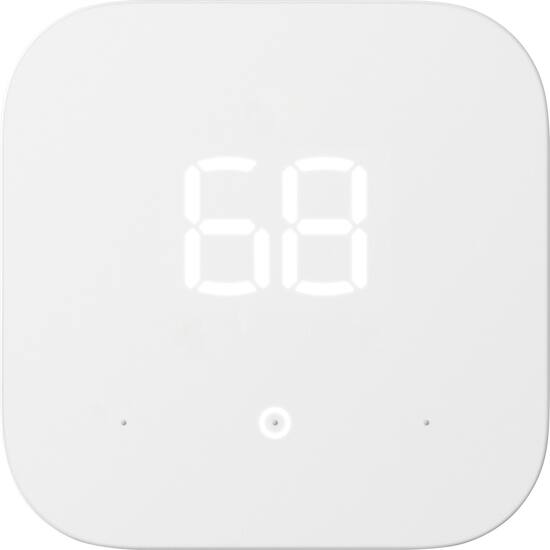
Credit: www.bestbuy.com
Environmental Impact
Smart thermostats for Alexa are more than just convenient gadgets. They help save energy and money. Their environmental impact is significant. These devices play a big role in reducing carbon emissions. They promote sustainable living. Let’s explore how they make a difference.
Reducing Carbon Footprint
Smart thermostats can lower your home’s energy use. By doing this, they reduce your carbon footprint. Every time you adjust the temperature efficiently, you save energy. This leads to fewer carbon emissions. Over time, these small changes add up.
- Use less energy
- Lower carbon emissions
- Help the planet
Here’s how a smart thermostat helps:
- Automatically adjusts to your schedule
- Optimizes heating and cooling
- Provides energy usage reports
These features make smart thermostats eco-friendly. They are a smart choice for green living.
Sustainable Living
Smart thermostats support sustainable living. They ensure your home uses energy efficiently. This leads to less waste and more savings. With Alexa integration, you can control settings with your voice.
Consider the benefits:
| Feature | Benefit |
|---|---|
| Voice Control | Easy adjustments |
| Energy Reports | Track usage |
| Smart Scheduling | Maximize savings |
These features make a big impact. They help you live sustainably. Making small changes at home can lead to big environmental benefits.
Troubleshooting
Smart thermostats compatible with Alexa help save energy and money. Sometimes, issues arise that need troubleshooting. This section covers common issues and quick fixes.
Common Issues
Users may encounter several common issues with smart thermostats:
- Connectivity Problems: The thermostat may not connect to Wi-Fi.
- Alexa Integration: Alexa may not control the thermostat.
- Temperature Inaccuracy: The thermostat shows the wrong temperature.
- Power Issues: The thermostat does not turn on.
Quick Fixes
Here are some quick fixes for these common issues:
| Issue | Quick Fix |
|---|---|
| Connectivity Problems |
|
| Alexa Integration |
|
| Temperature Inaccuracy |
|
| Power Issues |
|
Frequently Asked Questions
Can You Save Money With A Smart Thermostat?
Yes, you can save money with a smart thermostat. It optimizes heating and cooling, reducing energy consumption and lowering bills.
Do Smart Thermostats Lower Electric Bill?
Yes, smart thermostats can lower electric bills. They optimize heating and cooling, reducing energy consumption and costs.
What Smart Thermostats Are Compatible With Alexa?
Popular smart thermostats compatible with Alexa include Ecobee, Nest, Honeywell, and Emerson Sensi. These devices offer seamless integration and voice control.
Is There A Downside To Smart Thermostats?
Smart thermostats can be expensive and may have compatibility issues with older HVAC systems. Privacy concerns also exist.
What Is A Smart Thermostat?
A smart thermostat automates home temperature control via Wi-Fi and apps, enhancing comfort and energy efficiency.
How Does Alexa Work With Smart Thermostats?
Alexa integrates with smart thermostats, allowing voice commands to adjust temperature settings and create schedules.
Can Smart Thermostats Save Money?
Yes, they optimize energy usage, reduce waste, and lower utility bills by learning your habits and adjusting settings accordingly.
Which Smart Thermostats Are Alexa Compatible?
Popular Alexa-compatible smart thermostats include Nest Learning, Ecobee, Honeywell Home, and Emerson Sensi.
Do Smart Thermostats Need A C-wire?
Many smart thermostats require a C-wire for power, but some models offer alternatives like power extenders.
Are Smart Thermostats Hard To Install?
Most smart thermostats are user-friendly, with detailed instructions and support, making installation straightforward for most homeowners.
Conclusion
Choosing the best smart thermostat for Alexa can help you save energy and money. These devices offer convenience and efficiency. By integrating with Alexa, they simplify home automation. Make the switch to a smart thermostat today and enjoy both comfort and cost savings.
Your wallet and the environment will thank you.

